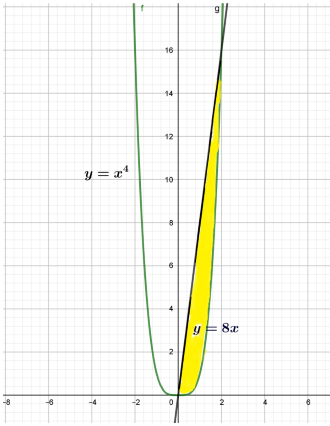Question
Question: How do you find the area of the region bounded by curves \[y={{x}^{4}}\] and y=8x?...
How do you find the area of the region bounded by curves y=x4 and y=8x?
Solution
This type of problem is based on the concept of plotting graph and integration. First, we have to consider the given two equations. Equate both the equations and find the values of x. Plot a graph with the two equations and the intersection points. Observing from the graph, find the interval for which integration should be done for both the equations. On integrating, we get the area bounded which is the required answer.
Complete step-by-step solution:
According to the question, we are asked to the area of the region bounded by curves y=x4 and y=8x.
We have been given the curves are y=x4 and y=8x.
On equating both the curves, we get
x4=8x
On adding -8x on both the sides of the equation, we get
x4−8x=8x−8x
On further simplification, we get
x4−8x=0
Here, we find that x is a common term. On taking x out as common, we get
x(x3−8)=0 ---------(1)
Since equation (1) is a product of two functions with variable x which is equal to 0, we get that the two functions are equal to 0.
Therefore, x=0 and x3−8=0.
Now, let us considerx3−8=0. ---------(2)
Add 8 from both the sides of the equation (2). We get
x3−8+8=0+8
We know that the terms with the same magnitude and opposite sign cancel out.
Therefore, x3=8.
Now, take the cube root on both the sides of the obtained equation. We get,
⇒3x3=38
We know that 3x3=x and 38=2. Let us substitute this in the equation.
⇒x=2
Therefore, the values of x are 0 and 2.
Let us now plot a graph with the curves y=x4 and y=8x.

Here, the part shaded in yellow is the part bounded by two curves.
To find the area of the bounded part we have to integrate the curves with respect to x in the interval [0,2].
Since the curve y=8x is above the curve y=x4, we have to subtract the integration of y=x4 from y=8x in the interval [0,2] with respect to x.
Therefore, Area=0∫28xdx−0∫2x4dx --------(3)
Let us first consider 0∫28xdx.
0∫28xdx=80∫2xdx
Using the power rule of integration, that is, ∫xndx=n+1xn+1. We get
0∫28xdx=8[1+1x1+1]02
On further simplification, we get
0∫28xdx=8[2x2]02
On substituting the limits to the function, we get
0∫28xdx=8[222−0]
⇒0∫28xdx=8[24]
On cancelling out the common term from the numerator and denominator, we get
0∫28xdx=4×4
∴0∫28xdx=16
Now, let us consider 0∫2x4dx.
Using the power rule of integration, that is, ∫xndx=n+1xn+1. We get
0∫2x4dx=[4+1x4+1]02
On further simplification, we get
0∫2x4dx=[5x5]02
Substituting the limits to the integral, we get
0∫2x4dx=[525−0]
We know that 25=32.
Therefore, 0∫2x4dx=[532].
Substituting both the values of integral in equation (3), we get
Area=0∫28xdx−0∫2x4dx
⇒Area=16−532
Taking LCM in the above expression, we get
Area=516×5−32
On further simplifications, we get
⇒Area=580−32
∴Area=548
Therefore, the area bounded by the curves y=x4 and y=8x is 548 sq. units.
Note: We should not forget to put the units in the last step. Also avoid calculation mistakes based on sign conventions. Always the curve obtained in the graph should be integrated first and then the other curve should be integrated. We can also find the answer integrating the function with respect to y. For this method, we have to find the values of y from the given curves.
